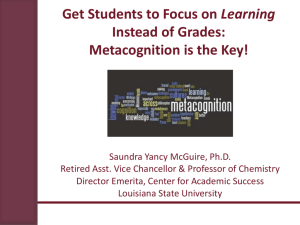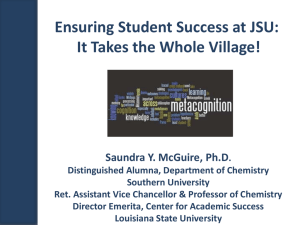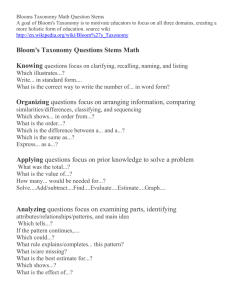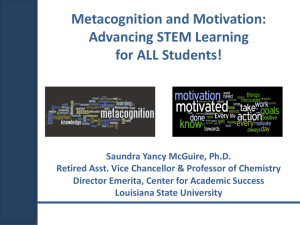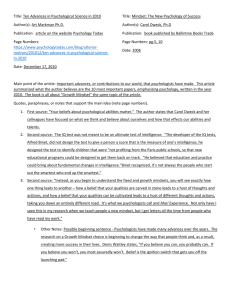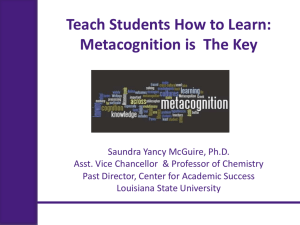Metacognition
advertisement
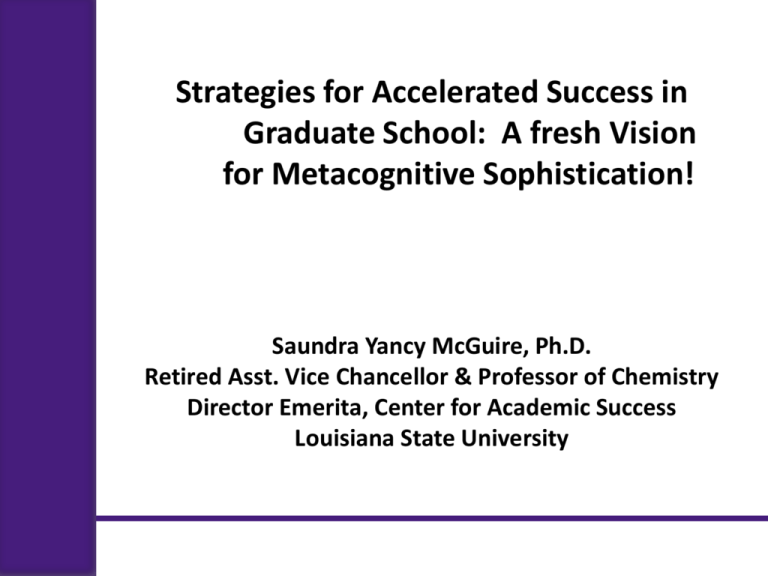
Strategies for Accelerated Success in Graduate School: A fresh Vision for Metacognitive Sophistication! Saundra Yancy McGuire, Ph.D. Retired Asst. Vice Chancellor & Professor of Chemistry Director Emerita, Center for Academic Success Louisiana State University 2004-2005 National College Learning Center Association Frank L. Christ Outstanding Learning Center Award Presidential Recognition White House Oval Office November 16, 2007 The Story of Two Students Travis, junior psychology student 47, 52, 82, 86 B in course Dana, first year physics student 80, 54, 91, 97, 90 (final) A in course How’d They Do It? They used metacognitive strategies They began thinking about their thinking They focused on learning instead of grades Metacognition* The ability to: • think about one’s own thinking • be consciously aware of oneself as a problem solver • monitor and control one’s mental processing (e.g. “Am I integrating all of the components?”) • accurately judge one’s level of learning *term coined by Flavell in 1976 Travis, junior psychology student 47, 52, 82, 86 Problem: Reading Comprehension Solution: Preview text before reading* Develop questions* Read one paragraph at a time and paraphrase information *Develop anticipatory set First Voyage of Christopher Columbus WITH HOCKED GEMS FINANCING HIM/ OUR HERO BRAVELY DEFIED ALL SCORNFUL LAUGHTER/ THAT TRIED TO PREVENT HIS SCHEME/ YOUR EYES DECEIVE/ HE HAD SAID/ AN EGG/ NOT A TABLE/ CORRECTLY TYPIFIES THIS UNEXPLORED PLANET/ NOW THREE STURDY SISTERS SOUGHT PROOF/ FORGING ALONG SOMETIMES THROUGH CALM VASTNESS/ YET MORE OFTEN OVER TURBULENT PEAKS AND VALLEYS/ DAYS BECAME WEEKS/ AS MANY DOUBTERS SPREAD FEARFUL RUMORS ABOUT THE EDGE/ AT LAST/ FROM NOWHERE/ WELCOME WINGED CREATURES APPEARED/ SIGNIFYING MOMENTOUS SUCCESS Dooling, J.D. and Lachman, R. Effects of Comprehension on Retention of Prose, Journal of Experimental Psychology, (1971), Vol. 88, No. 2, 216-222 Dana, first year physics student 80, 54, 91, 97, 90 (final) Problem: Memorizing formulas and using www.cramster.com Solution: Solve problems with no external aids and test mastery of concepts LSU Analytical Chemistry Graduate Student’s Cumulative Exam Record 2004 – 2005 2005 – 2006 9/04 Failed 10/05 Passed 10/04 Failed 11/05 Failed 11/04 Failed 12/05 Passed best in group 12/04 Failed 1/06 Passed 1/05 Passed 2/06 Passed 2/05 Failed 3/06 Failed 3/05 Failed 4/06 Passed last one! 4/05 Failed 5/06 N/A Began work with CAS and the Writing Center in October 2005 Dr. Algernon Kelley, December 2009 How’d They Do It? They became expert learners by using metacognition! They learned to think about their own thinking, and they studied to LEARN, not just to make the grade! Reflection Questions • What’s the difference, if any, between studying and learning? • For which task would you work harder? A. Make an A on the test B. Teach the material to the class To Ace Courses (and everything else!) • Stay in learn mode, not study mode • Work as if you have to teach the material, not just make an A on the test Counting Vowels in 45 seconds How accurate are you? Dollar Bill Dice Tricycle Four-leaf Clover Hand Six-Pack Seven-Up Octopus Cat Lives Bowling Pins Football Team Dozen Eggs Unlucky Friday Valentine’s Day Quarter Hour 16 How many words or phrases do you remember? Let’s look at the words again… What are they arranged according to? Dollar Bill Dice Tricycle Four-leaf Clover Hand Six-Pack Seven-Up Octopus Cat Lives Bowling Pins Football Team Dozen Eggs Unlucky Friday Valentine’s Day Quarter Hour NOW, how many words or phrases do you remember? What were two major differences between the first attempt and the second attempt? 1. We knew what the task was 2. We knew how the information was organized Research findings about learning • Active learning is more lasting than passive learning -- Passive learning is an oxymoron* • Thinking about thinking is important – Metacognition** • The level at which learning occurs is important – Bloom’s Taxonomy*** *Cross, Patricia, “Opening Windows on Learning” League for Innovation in the Community College, June 1998, p. 21. ** Flavell, John, “Metacognition and cognitive monitoring: A new area of cognitive– developmental inquiry.” American Psychologist, Vol 34(10), Oct 1979, 906-911. *** Bloom Benjamin. S. (1956). Taxonomy of Educational Objectives, Handbook I: The Cognitive Domain. New York: David McKay Co Inc. Bloom’s Taxonomy Making judgments based on criteria and standards through checking and critiquing. This pyramid depicts the different levels of thinking we use when learning. Notice how each level builds on the foundation that precedes it. It is required that we learn the lower levels before we can effectively use the skills above. Creating Evaluating Analyzing Carrying out or using a procedure through executing, or implementing. Breaking material into constituent parts, determining how the parts relate to one another and to an overall structure . Applying Understanding Retrieving, recognizing, and recalling relevant knowledge from long-term memory. Putting elements together to form a coherent or functional whole; reorganizing elements into a new pattern or structure through generating, planning, or producing. Constructing meaning from oral, written, and graphic messages through interpreting, exemplifying, classifying, summarizing, inferring, comparing, and explaining. Remembering http://www.odu.edu/educ/llschult/blooms_taxonomy.htm How do you move higher on Bloom’s Taxonomy? Use the Study Cycle* *adapted from Frank Christ’s PLRS system The Study Cycle 34 Reflect Review Preview Preview before class – Skim the chapter, note headings and boldface words, review summaries and chapter objectives, and come up with questions you’d like the lecture to answer for you. Attend Attend class – GO TO CLASS! Answer and ask questions and take meaningful notes. 4 Reflect Review Study Assess Review after class – As soon after class as possible, read notes, fill in gaps and note any questions. Study – Repetition is the key. Ask questions such as ‘why’, ‘how’, and ‘what if’. • Intense Study Sessions* - 3-5 short study sessions per day • Weekend Review – Read notes and material from the week to make connections Assess your Learning – Periodically perform reality checks • Am I using study methods that are effective? • Do I understand the material enough to teach it to others? *Intense Study Sessions Decide what you want to accomplish in your study session 1 Set a Goal 2 Study with Focus (30-50 min) Interact with material- organize, concept map, summarize, process, re-read, fill-in notes, reflect, etc. 3 Reward Yourself (10-15 min) Take a break– call a friend, play a short game, get a snack 4 Review (1-2 min) (5 min) Go over what you just studied Center for Academic Success B-31 Coates Hall ▪ 225.578.2872 ▪www.cas.lsu.edu Concept maps develop ability to think critically And there are many different forms of concept maps Chapter/Paper Map Title of Chapter/Paper Primary Headings Subheadings Secondary Subheadings Compare and Contrast Thermodynamic Control Kinetic Control How are they similar? How are they different? Time Management Is Life Management Tools for organizing your life: • Fixed Schedules – “Semester-at-a-Peek” – “Week-at-a-Peek” • Planners • To Do Lists – Today – This Week – Sticky Notes Time Management Tips from Students Have a vision—Set goals Know YOUR unique time management style Study when the sun is out Avoid napping Develop patterns “This is what I do” Think of yourself as a Professional Student Kill the TV, cell phone, video game… Email/chat/Facebook…only as a reward Exercise Eat well Drink water Take breaks Have fun It’s Crucial to Develop the Right Mindset Dweck, Carol, 2006. Mindset: The New Psychology of Success. New York: Random House Publishing Shenk, David, 2010. The Genius in All of Us: Why Everything You've Been Told About Genetics, Talent, and IQ Is Wrong. New York: Doubleday Mindset* Matters! Fixed Intelligence/Ability Mindset Intelligence/ability is static You have a certain amount of it Growth Intelligence/Ability Mindset Intelligence/ability can be developed You can grow it by your actions *Dweck, Carol (2006) Mindset: The New Psychology of Success. New York: Random House Publishing Mindset determines reactions to • Challenges – avoid vs. embrace • Obstacles – give up easily vs. persist • Tasks requiring effort – fruitless vs. path to mastery • Criticism – ignore vs. learn from • Success of Others – feel threatened by vs. find lessons and inspiration in ABC’s of Excellence • Adopt the right ATTITUDE • Exhibit appropriate BEHAVIOR • Consistently make a COMMITMENT Attitude “It’s your attitude, not your aptitude, that determines your altitude.” Zig Ziglar Expect Obstacles Remember that stumbling blocks and stepping stones may look identical; YOU determine which role they will play! Behavior It’s the difference between knowing and doing that determines success. Anonymous Don’t let other folks hijack your future! Commitment It’s not over ‘til it’s over, and YOU determine when it’s over! Change strategies when necessary, but never give up your goals. If you can dream it, you can achieve it! So, What Can You Do, Starting Now, to Ensure Success in Grad School and Beyond? • Spend more time studying (at least 2 hrs/wk for every hour in class) • Aim for higher learning levels and 100% understanding • Use office hours and study groups productively • Use the Study Cycle with Intense Study Sessions • Use Metacognition to Study Smarter!!! Writing Exercise What behavior will you change for the next three weeks? If you don’t start it within the next 48 hours... … you probably never will. Final Note Please visit our website at www.cas.lsu.edu. We have on-line workshops and information that will teach you more effective study strategies. I wish you a fantastically successful future! Dr. Saundra McGuire
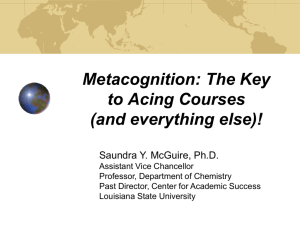
![File [ptx]](http://s3.studylib.net/store/data/009427298_1-8f707a5a5fa6e5d11883ac6bfef16f05-300x300.png)
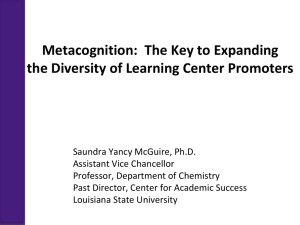
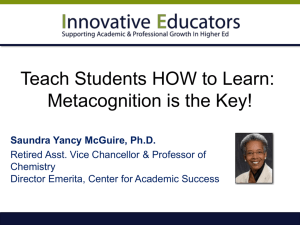
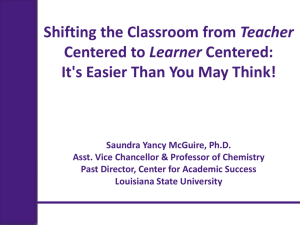
![File [ptx] - Kent State University](http://s3.studylib.net/store/data/009471766_1-c9863c0101d52ef451e19680e4b3f848-300x300.png)
